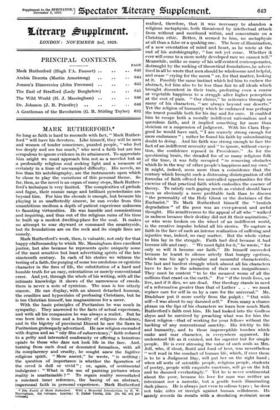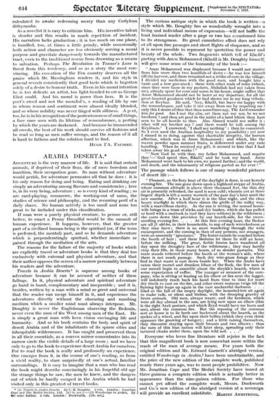MARK RUTHERFORD.*
So long as faith is bard to reconcile with fact, "Mark Ruther- ford" will have his devotees. Like himself, they will be men and women of tender conscience, puzzled people, "who feel too deeply and see too much," who need a faith but are too scrupulous to ignore evidence in its attainment. To appreciate him aright we must approach him not as a novelist but as a profoundly religious soul seeking light and a measure of certainty in a time of unexampled difficulty. His novels, no less than his autobiography, are the instruments upon which he chose to play the variations of this personal theme. So far, then, as the novel is an organ of many stops, Mark Ruther- ford's technique is very limited. The complexities of prelude and fugue, their cosmic range and brilliant pyrotechnics are beyond him. For him the chorale is enough, but because his playing is so unaffectedly sincere, he can evoke from this unambitious medium a depth of patient experience unknown to flaunting virtuosities. He was humble and conscientious and inquiring, and thus out of the religious ruins of his time he built up a modest dwelling-place for the soul. It makes no attempt to soar skyward or command the countryside, but its foundations are on the rock and its simple lines are comely.
Mark Rutherford's work, then, is valuable, not only for that happy etaftsmanship to which Mr. Massingham does excellent justice, but also because he represents quite uniquely some of the most sensitive but least advertising spirits of the late nineteenth century. In each of his stories we witness the testing of a faith, the purging of some too credulous or egotistic character in the fires of life, the substitution of a hard and humble truth for an easy, ostentatious or merely conventional error. And yet, through the whole of his writing, with all the intimate knowledge it shows of the narrowness of creeds. there is never a note of cynicism. The man is too utterly sincere. He can display, with an almost detached humour, the cruelties and hypocrisies of professing Christians, but he is too Christian himself, too magnanimous for a sneer.
With the basic principles of Puritanism he was much in sympathy. They answered to the facts of actual experience, and with all his compassion he was always a realist. But he was born into a time and a locality of religious decadence, and in the bigotry of provincial Dissent he saw the flaws in Puritanism grotesquely advertised. He Saw religion encrusted with dogma and an "oily film of subserviency," faith reduced to a petty and interested conformity or offering a luxurious opiate to those who dare not look life in the face. And, turning from such dead or decorated formalism, with all its complacency and cruelty, he sought anew the fugitive religious, spirit. "Mere assent," he wrote, "is nothing ; the question of importance is whether the figuration of the creed is dull or vivid " ; or, again, of sentimental indulgence: "What is the use of painting pictures when reality is unattainable ?-" To regain reality necessitated a constant inner reference, the basing of an abstract, impersonal faith in personal- experiences . Mark Rutherford • The Roods of Mark Rutherford. With a Memorial Introduction by IL W. Ma.ssinghaPax.Si4 VOIUR" 14MadaliT,FialAW trawls& LPL Oa dd. ink per volwaLl - - realized, therefore, that it was necessary to abandon a religious metaphysic, both threatened by intellectual attack from without and moribund within, and concentrate on a Christian ethic. Better, it seemed to him, no metaphysic at all than a false or a quaking one. The hour of illumination, of a new orientation of mind and heart, as he wrote at the end of his autobiography, "has not yet come. Whether it ever will come to a more nobly developed race we cannot tell." Meanwhile, unlike so many of his self-centred contemporaries, distraught by the rocking of theoretical foundations, he adver- tised in all he wrote that men should be wholesome and helpful, and cease "crying for the moon" or, for that matter, looking at it. Possibly the same instinct which led him to eschew the abstract, led him also to be less than fair to all ideals which brought discontent in their train, preferring even a coarse or vegetable happiness to a struggle after higher perception at the cost of pain. "Our claims," he reiterates through so many of his characters, "arc always beyond our deserts." Yet the religion of humanity which he embraced was perhaps the truest possible both for his day and for ours. It enabled him to escape both a morally indifferent rationalism and a querulous faith, and it implied something far more than stoicism or a suspension of judgment. With his Clara Hop- good he would have said, "I am scarcely strong enough for mere endurance " ; rather he found his faith by subordinating doubt to doing. And his faith was strong enough to face the feet of an indifferent necessity and "to ignore, without excep- tion, the confidence reposed in Providence." As for the questioning brain, the dreaded foe of so many religious folk of the time, it was fully occupied "in removing obstacles which lie in the way of other people's happiness and my own." It might, indeed, seem more than a coincidence that the century which brought such a distressing disintegration of old formulas of faith offered too unrivalled opportunities for the exercise of that practical faith which embodies the essence of theory. To satisfy such gaping needs as existed should have been so obviously a more profitable task than to discuss "the personality of the Holy Ghost or the doctrines of the Eucharist." To Mark Rutherford himself the "brutish degradation" of the poor was an ever-present and awful thought. His sensitiveness to the appeal of all who "walked in sadness because their destiny did not fit their aspirations," or who were broken on the wheel of an indifferent world, is the creative impulse behind all his stories. To capture a faith in the face of such an intense realization of suffering and injustice was, indeed, no easy matter. But the whole virtue to him lay in the struggle. Faith had died because it had become idle and easy. "We must fight for it," he wrote, "for only so will it become our faith." He himself succeeded because he learnt to silence utterly that hungry egotism, which was his age's peculiar and mournful characteristic. The last and hardest struggle which almost all his characters have to face is the admission of their own insignificance. They must be content "to be the meanest worm of all the millions that crawl on the earth." For "if the truth lives, rue live, and if it dies, we are dead. Our theology stands in need of a reformation greater than that of Luther . . . we must replace care for self in us by a care for the universal." Mr. Bradshaw put it more curtly from the pulpit : "Out with self—I was about to say damned self." From many a chance phrase on the lips of his characters we learn how much Mark Rutherford's faith cost him. He had looked into the Godless abyss and he survived by preaching what was for him the finest religion—that of working for your fellows without the backing of any conventional sanctity. His fidelity to life and humanity, and to those imperceptible touches which make and mar character, is everywhere apparent. He understood life as it existed, not for superior but for simple people. He is ever stressing the value of such souls as Mrs. Jell, who, if stout, florid and fond of beer, was nevertheless "well read in the conduct of human life, which, if ever there is to be a Judgment Day, will put her on the right hand ; when all sorts of scientific people, religious people, students of poetry, people with exquisite emotions, will go on the left and be damned everlastingly." Yet he is never sentimental about the poor, because his love for man was neither an intoxicant nor a narcotic, but a gentle torch illuminating dark places. He is always just even to odious types ; he does not take sides or inveigh against human selfishness. He merely records its results with a desolating restraint more
calculated to awake redeeming mercy than any Carlylean dithyrambs.
As a novelist it is easy to criticize him. His inventive talent is slender and this results in much repetition of incident. His narration lacks graduation ; it is too much on one plane, is handled, too, at times a little primly, while occasionally both action and character are too obviously serving a moral purpose and gravitate dangerously towards the manufactured tract, even to the traditional rescue from drowning as a means to salvation. Perhaps The Revolution in Tanner's Lane is freest from this tendency, and so as a story the most con- vincing. His evocation of the Fen country deserves all the praise which Mr. Massingham renders it, and his style in general reveals consistently that good taste which is begotten solely of a desire to honour truth. Even in his moral intention he is too delicate an artist, too light-handed to err as George Eliot could. And his moral is purer than hers. It is the poet's creed and not the moralist's, a reading of life by one in whom reason and sentiment were almost ideally blended, and so whose nobility was never tinged with silliness. A pcet, too, he is in his recognition of the portentousness of small things, a face once seen with its lifetime of remembrance, a parting by which the years are darkened. And because he transcended all creeds, the best of his work should survive all fashions and be read so long as men suffer wrongs, and the reason of it all is hard to fathom and the solution hard to find.
HUGIL I'A. FAUSSET.



























































 Previous page
Previous page